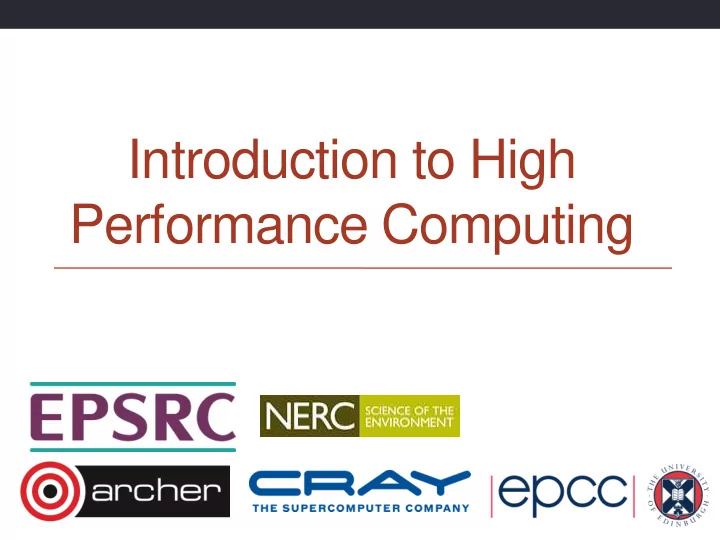

Introduction to High Performance Computing
Reusing this material This work is licensed under a Creative Commons Attribution- NonCommercial-ShareAlike 4.0 International License. http://creativecommons.org/licenses/by-nc-sa/4.0/deed.en_US This means you are free to copy and redistribute the material and adapt and build on the material under the following terms: You must give appropriate credit, provide a link to the license and indicate if changes were made. If you adapt or build on the material you must distribute your work under the same license as the original. Note that this presentation contains images owned by others. Please seek their permission before reusing these images.
Course Parameters • Pre-requisites • None, this course is designed for everyone, from computing novices upwards, to be able to participate in and complete • Hands-on practicals form an integral part of the course. • We will help with these, and do not expect any programming experience of attendees (although you’re free to dive into the programs if you have more computing experience)
Aims • Why do people use HPC? • What do people use HPC for? • Understanding of computer hardware • Which parts matter for performance in modelling and simulation? • Understanding of processes and threads • Understanding of parallel programming models • How to interact with a HPC resource • Knowledge of current HPC architectures • Knowledge of current parallel programming libraries • Appreciation of the future of HPC
ARCHER Driving Test • https://www.archer.ac.uk/training/course-material/online/driving_test.php • an on-line assessment tool which allows those new to ARCHER to demonstrate that they are sufficiently familiar with ARCHER and HPC to start making use of it. • suitable for anyone who has completed a Hands-On introduction to HPC ARCHER training course, or for users of other HPC systems who have familiarised themselves with the specifics of running jobs on ARCHER by reading up the online Introduction to ARCHER resources. • On successful completion of the Driving Test, you will be invited to apply for an account and awarded an allowance of 1200 kAUs (80,000 CPU core hours) to use to run jobs over a period of up to 12 months.
Timetable Day 2 Day 1 09:30 LECTURE: HPC Architectures 09:30 Welcome, Overview and Syllabus 09.45 LECTURE: Why learn about HPC? 10:15 LECTURE: Batch systems 10:15 LECTURE: Image sharpening 10:45 LECTURE: Computational Fluid Dynamics (CFD) 10:30 PRACTICAL: Sharpen example 11:00 BREAK: Coffee 11:00 BREAK: Coffee 11:30 LECTURE: Parallel Programming 11:30 PRACTICAL: CFD 12:15 PRACTICAL: Sharpen (cont.) 12:30 LECTURE: Compilers 13:00 BREAK: Lunch 13:00 BREAK: Lunch 14:00 LECTURE: Building Blocks 14:00 PRACTICAL: Compilers (CFD (CPU/Memory/Accelerators) cont.) 14:30 LECTURE: Building Blocks 14:30 LECTURE: Parallel Libraries (OS/Process/Threads) 15:00 LECTURE: Fractals 15:00 LECTURE: Future of HPC 15:10 PRACTICAL: Fractal example 15:30 BREAK: Tea 15:30 BREAK: Tea 16:00 LECTURE: Summary 16:00 LECTURE: Parallel programming 16:15 PRACTICAL: Finish exercises models 17:00 CLOSE 16:45 PRACTICAL: Fractals (cont.) 17:30 CLOSE
Course materials • Everything online: • slides, exercise notes, code to use http://www.archer.ac.uk/training/course- material/2017/07/intro-epcc/
Documentation • See http://www.archer.ac.uk/documentation/ • The Quick Start Guide at https://www.archer.ac.uk/support/getting-started/ is a good place to start.
Support • Helpdesk • Email support@archer.ac.uk • via ARCHER SAFE http://www.archer.ac.uk/safe • phone: +44 (0)131 650 5000 • By post, to: Anne Whiting EPCC University of Edinburgh JCMB The King's Buildings Mayfield Road EDINBURGH EH9 3JZ
Training opportunities • ARCHER Training (free to academics): • http://www.archer.ac.uk/training/ • EPCC MSc in HPC • http://www.epcc.ed.ac.uk/msc/ • EPCC accredited online HPC courses • http://www.epcc.ed.ac.uk/online-courses/
Funding calls • Embedded CSE support • Through a series of regular calls, Embedded CSE (eCSE) support provides funding to the ARCHER user community to develop software in a sustainable manner for running on ARCHER. Funding will enable the employment of a researcher or code developer to work specifically on the relevant software to enable new features or improve the performance of the code • Apply for funding for development effort • Twelfth call expected to open 1 th August 2017 • Closes on 12 st September 2017 • Happen every 4 months (although this might be the last one) • See http://www.archer.ac.uk for details
Feedback and follow-up • http://www.archer.ac.uk/training/feedback/ • Virtual Tutorials • Online every second Wednesday of the month at 15:00 • http://www.archer.ac.uk/training/virtual/ • Technical webinars at the same URL • usually also on Wednesday afternoons
Recommend
More recommend